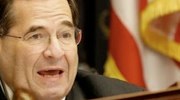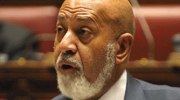![]() The historic Don’t Ask, Don’t Tell hearings began today. Entire hearing is below.
The historic Don’t Ask, Don’t Tell hearings began today. Entire hearing is below.
Topic >> dadt
 In an interview with DC Agenda (formerly the Washington Blade), Rep. Jerrold Nadler (D-NY) did not expect to take up his “Respect for Marriage Act” until 2011, after other LGBT-focused legislation had been voted on, including the ENDA, DADT and UAFA.
In an interview with DC Agenda (formerly the Washington Blade), Rep. Jerrold Nadler (D-NY) did not expect to take up his “Respect for Marriage Act” until 2011, after other LGBT-focused legislation had been voted on, including the ENDA, DADT and UAFA.
“The Respect for Marriage Act comes up after that, maybe at the end of the next Congress, maybe afterward,” he [Nadler] said.
Nadler’s legislation would overturn DOMA, allowing the federal government to recognize same-sex marriages. It also has a “certainty provision” that would allow same-sex couples to marry in one state and still receive federal benefits even if they move to another state where gay nuptials aren’t recognized.
In lieu of passage in this Congress, Nadler said the task for supporters is to find more co-sponsors for the bill. As of Tuesday, the bill had 105 co-sponsors. Nadler predicted support would grow.
“And I think if some of these other bills pass, it’ll become more — the idea becomes less avant garde,” he said.
Nadler also introduced the Uniting American Families Act (UAFA) earlier this year, which would allow gays and lesbians to sponsor their foreign-born partners for citizenship, and is pushing for that legislation to be a part of larger immigration reform in 2010.
“I don’t know what the final comprehensive immigration reform will look like, but I remain optimistic that it will include lesbian and gay families,” he said.
In the event that comprehensive immigration reform legislation doesn’t include UAFA when it debuts, Nadler said he’s working on making sure there are votes in the House Judiciary Committee to amend the bill to include such a provision.
Nadler said he’s “hopeful” there will be enough votes for an amendment, but added “that’ll be a big fight, if necessary.”
“I haven’t taken any votes or whip counts or done any kind of that work, but certainly it will be something that we’ll have to work at and the gay community and everybody will have to be pressuring the individual members of the committee,” Nadler said. “A lot of the members of the committee, the Democratic members especially, say they’re very great friends with the gay community … and this’ll be an opportunity to show that they are, bar none.”
When asked if he would support immigration reform without a UAFA or similar provision, Nadler reponded “I hope it doesn’t come to that.”
So do we.
New bill would allow enlisted gay soldiers to testify against DADT without fear
lgbt, politics, video 1 Comment » In a bill introduced today by Florida Rep. Alcee Hastings, enlisted gay and lesbian soldiers could testify against DADT without fear of retribution. From Hasting’s website:
In a bill introduced today by Florida Rep. Alcee Hastings, enlisted gay and lesbian soldiers could testify against DADT without fear of retribution. From Hasting’s website:
The Honest and Open Testimony Act expands current whistleblower protections between members of the Armed Forces and Members of Congress to include communications from active-duty service members who testify concerning Don’t Ask, Don’t Tell in a Congressional hearing, as well as those who do so and disclose their sexual orientation.
“Don’t Ask, Don’t Tell hurts our troops, runs counter to the values of our Armed Forces, and threatens our national security. Since the law was implemented in 1994, over 13,500 qualified service members have been lost to Don’t Ask, Don’t Tell, and counting. Furthermore, Don’t Ask, Don’t Tell continues to undermine and demoralize the more than 65,000 GLBT Americans currently serving on active duty,” said Hastings.
“As the United States continues to work toward responsibly ending the war in Iraq and reengages the threat from al Qaeda in Afghanistan, our GLBT service members offer invaluable skills that enhance our military’s potency and readiness. They are linguists, aviators, medics, and highly-trained soldiers who are involved in valuable operations that have nothing to do with their sexual orientation and everything to do with protecting our freedom and advancing our national security interests.
Hastings is a long time opponent of the Don’t Ask, Don’t Tell policy. Back in September he introduced an amendment to a defense appropriations bill which would have cut off funding for future DADT investigations. His appearance on Rachel Maddow below.
Visit msnbc.com for Breaking News, World News, and News about the Economy
 Secretary of the Army John McHugh said in an interview with the Army Times that the Army could handle a repeal of the controversial Don’t Ask, Don’t Tell policy without major disruption, but refused to offer his personal views on the issue. From the Army Times:
Secretary of the Army John McHugh said in an interview with the Army Times that the Army could handle a repeal of the controversial Don’t Ask, Don’t Tell policy without major disruption, but refused to offer his personal views on the issue. From the Army Times:
McHugh finds himself at the center of debate over Obama’s pledge to repeal the law banning open service by homosexuals.
In the interview, McHugh carefully avoided offering his personal views on the issue, saying his job now is to provide input to Obama on how to make the change and to talk with members of Congress about the issue.
Selling the idea to Congress, which has the final say, could depend on exactly what the administration tries to do in terms of the timing of repeal and how it is applied, McHugh said.
It’s possible, for example, that homosexuals could be allowed into some occupations or units but barred from others, McHugh said, stressing that he was not aware of any such plans but only discussing how the issue might play out.
“I don’t want to prejudge the situation,” he said. “I am saying if he did that, it would be my job to explain it when the appropriate time comes.”
When asked specifically if lifting the gay ban would seriously disrupt the military, as predicted by those who oppose repeal, McHugh said there is no reason to think major turmoil would ensue.
“Anytime you have a broad-based policy change, there are challenges to that,” he said. “The Army has a big history of taking on similar issues, [with] predictions of doom and gloom that did not play out,” he said.
During hearings on DADT back in 2008, McHugh, who then served as a Republican congressman from New York, appeared disappointed with the DoD’s failure to review the policy…
“I share the chairlady’s [Rep. Susan Davis] disappointment that thus far the services, as a whole, have not agreed to step forward. I don’t see as an individual member how I fully and fairly consider this question and more importantly the issue of changing this question without the input of those in the active military who have the heavy responsibility of commanding our forces in time of war. I would hope and encourage both the Department of Defense and the various services to reconsider the reluctance that they have displayed to this point.”